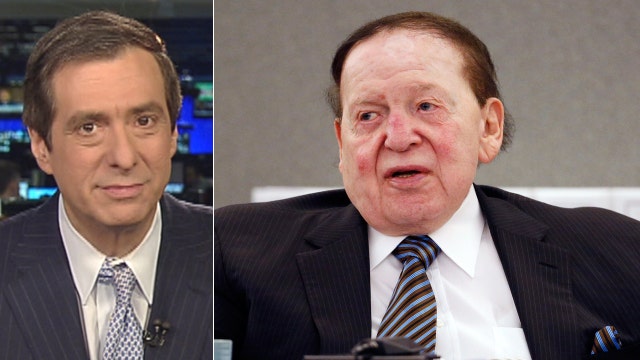Kurtz: Paper looks for its 'Daddy'
'Media Buzz' host reacts to Sheldon Adelson's purchase of the Las Vegas Review-Journal
It’s downright bizarre: A newspaper struggling to figure out who its owner is.
And yet that’s what unfolded at the Las Vegas Review-Journal, complete with tweets from staffers asking “who’s our daddy.”
We now know the mystery buyer was Sheldon Adelson, the billionaire casino mogul who is a major-league donor in Republican politics.
Now I don’t have any problem with the purchase itself. Newspapers tend to be bought by rich guys, especially these days, when they’re not such a great investment. Jeff Bezos, the Amazon founder, bought the Washington Post. Mort Zuckerman, a real estate developer, owns New York’s Daily News (and launched that front-page attack on the GOP after the San Bernardino killings). Red Sox owner John Henry bought the Boston Globe. Rupert Murdoch, the owner of 21st Century Fox (parent of Fox News) and News Corp., bought the Wall Street Journal and continues to subsidize the New York Post. For that matter, Alexander Hamilton founded the Post.
The tradition goes back to William Randolph Hearst, who bought the New York Journal and a bunch of others, helped prod the country into the Spanish-American War, was elected as a Democratic congressman and ran for other offices. Citizen Kane may not have been good for journalism, but he knew how to sell papers.
But we knew who owned those newspapers. Adelson completed his $140-million purchase as a stealth operation. That doesn’t seem to match the values of a free press dedicated to transparency.
Adelson, 82, is one of the richest men in America and a Republican power player who already owned a Tel Aviv newspaper. He spent $92 million during the 2012 cycle, emerging as a major donor for Newt Gingrich and eventually for Mitt Romney. In this campaign, he has met with several presidential candidates, including Donald Trump.
So readers of the Las Vegas paper would have a right to know who was bankrolling the Review-Journal as a way of assessing any change in its news coverage, as well as its editorial policy.
In what amounts to a declaration of independence--or a finger in the new owner's eye--the paper's editorial page made this declaration over the weekend:
"We'll disclose their ownership of the Review-Journal when covering the gaming industry, when government actions affect their properties, when Las Vegas Sands and its subsidiaries have business in the courts, and even when we're reviewing or previewing shows, restaurants and events at their properties. We'll disclose candidates and office holders who've received political contributions from the Adelsons. And if a story might cast a Las Vegas Sands competitor in poor light, we'll disclose our ownership in that case, as well. We'll disclose, disclose, disclose. That way, you can be the judge of whether we're being fair or whether we've become a micromanaged public relations tool."
After the initial disclosure by Fortune, the Review-Journal itself reported that Adelson’s son-in-law had orchestrated the stealth purchase.
Democratic Rep. Dina Titus, who addressed the issue on the House floor, told the paper that “a lot of people are being very brave working for the RJ and calling for this. And, this is a bigger issue because it applies to the press anywhere.”
Then the Review-Journal published an investigative piece saying that a month before the Adelson family’s purchase was revealed, “three reporters at the newspaper received an unusual assignment passed down from the newspaper's corporate management: Drop everything and spend two weeks monitoring all activity of three Clark County judges.”
One of those judges is hearing a wrongful termination suit against Adelson and his Las Vegas Sands Corp.
“The memo, authored by Review-Journal Deputy Editor James G. Wright, notes the initiative was undertaken without explanation from GateHouse [the previous owners] and over the objection of the newspaper's management, and there was no expectation that anything would be published. ‘We've simply been told we must do it, and it must start on Tuesday,’ Wright wrote.”
Now that kind of order, which smells like an effort to use reporters for personal information-gathering, should make anyone who cares about journalism uncomfortable.
Steve Freiss, a former Review-Journal staffer, writes in Time that the purchase makes little sense: “The R-J has always been staunch conservative and already generally agrees with almost everything Adelson believes: Obama is bad for America, unions are destructive, and the U.S. needs to do everything Israel needs. Why buy the cow when you get the GOP-flavored milk for free?”
Well, maybe. With newspaper ownership comes added influence, as everyone from Zuckerman to Murdoch understands. Adelson has every right to join their ranks. But why not be up front about it rather than shrouding the move in secrecy?













































